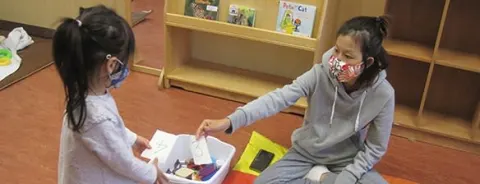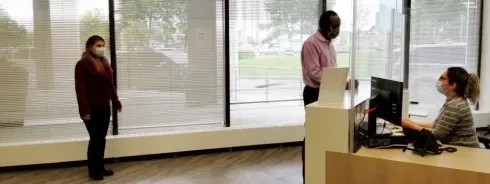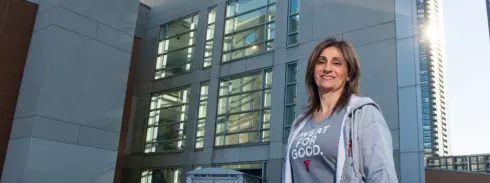
Ignite the Light spans five years over which the GTA will continue to grapple with emergency responses to the COVID-19 pandemic and embark on a long road to recovery. Just as the YMCA of Greater Toronto has stepped up to meet unprecedented needs in the past — from serving as a relief centre in the aftermath of Hurricane Hazel in 1954 to delivering child care to support women entering the work force after the Second World War — so too are we committed to partnering with our communities to address critical needs and supporting each other through this crisis.
Brightening our communities’ darkest days
It’s impossible to predict precisely how our communities’ needs will evolve, and therefore impossible for us to detail precisely how we will step up to meet them. That said, we do have a precedent today; we now know what’s at stake, for our Y and for our region, and we have many months of hard work to look back on and learn from. Based on our response throughout 2020, these are just some of the ways we anticipate our YMCA might continue to help the GTA recover and rebuild from the devastation the pandemic has caused.
1. Repurposing our spaces to meet emergency needs

Digital offerings have exploded during the pandemic and will continue to prove invaluable. However, we have also seen that some needs simply cannot be met virtually. Physical spaces must be reimagined — even if only temporarily — so people can access essentials.
2. Investing in affordable, accessible, high-quality child care

COVID-19 kicked off a “she-cession,” potentially setting women back decades in terms of their ability to bring their talents and expertise to our workforce. One barrier is that child care responsibilities continue to fall disproportionately to women.
During the first wave, we offered up our buildings to hospitals across the GTA in case they became overwhelmed and overcrowded. Later, we repurposed spaces as COVID-19 testing and vaccination clinics. As food insecurity peaked, we transformed eight of our centres into pop-up food banks and three of those have been permanent. We, also turned part of our YMCA Cedar Glen Outdoor Centre into a food sorting and distribution site for York Region, and collected hundreds of pounds of non-perishables through food drives at our Health & Fitness centres.
The YMCA is present in 400+ locations across the GTA, including nine larger Centres of Community, each offering tens of thousands of square feet of space that can be repurposed during emergencies. In the future, YMCAs could be used as additional vaccination sites and, temporary food banks, or emergency shelters for people experiencing homelessness, to name just three of many possibilities.
During the lockdowns, the YMCA cared for the children of essential workers — nurses, doctors, police, firefighters, personal support workers, grocery store staff, and so many more — so they could do their crucial work on the frontlines.
As the largest not-for-profit child care provider in Canada, we know how critical this service is for our economic recovery. We’ll continue our fifty-year-long legacy of delivering and advocating for more high-quality, affordable child care, so more families who need and want it have this option available to them.
3. Housing vulnerable groups

No one can live up to their full potential without a decent home, let alone a safe place to sleep. The pandemic has shown just how vulnerable seniors and youth are to the dangers of life on the street.
4. Helping job-seekers find work

COVID-19 has led to unprecedented job insecurity and financial struggle. Youth in particular are facing unique barriers: as education, training, and opportunities to gain work experience are all upended, many can't even get a foothold in the labour market.
YMCA Sprott House and the Vanauley Street YMCA kept their doors open to at-risk youth throughout the state of emergency and beyond. Extra staff were deployed, including to a hotel site to allow for increased physical distancing, and additional health and safety precautions were implemented to ensure we could continue offering youth experiencing homelessness emergency shelter and free, empowering supports.
Over the next five years, we will continue serving as a critical lifeline for homeless and at-risk youth, helping to meet not only their immediate needs, but also offering resources like legal guidance and employment programs that help them build brighter futures for themselves. We will also expand our work to create more and fairer housing options for older adults.
During lockdown, our Employment services team offered the support for un- and underemployed individuals that we know will be essential as we work to rebuild our economy. They began reaching job seekers online and by phone for one-on-one help, and offering digital webinars and job fairs to connect them with new opportunities.
Losing their already-precarious jobs, missing out on summer internships, and watching the labour pool dry up just as they were supposed to wade into it — these challenges and more are dimming the next generation's potential. We’ll focus on youth in particular as we help those disadvantaged in finding employment navigate a labour market unlike any we’ve experienced before.
5. Prioritizing mental health

The pandemic brought Canadians’ decades-long mental health crisis out of the shadows. Not only did it stir up feelings of worry, fear, and anxiety; it also hindered access to the resources people need to support their mental well-being.
6. Near-term Initiatives
We have identified near-term initiatives to focus on during the first 15 months of the plan.
Just three days after closing the doors of our Health & Fitness centres in March 2020, our community reunited virtually in a group fitness class livestreamed straight to their homes. Over the course of the summer 2020, our Y would share 545 videos to help our members stay active and connected, culminating in over 2.1 million views. Our ever-evolving fitness options, which now include outdoor classes (when permitted) and virtual classes and personal training, continue to support our members’ physical and mental well-being throughout a crisis that threatens both. We’ve also extended support in other ways with many programs pivoting to include remote employment services, virtual camp activities and our new online community The Bright Spot which connects older adults, many of whom were already feeling isolated before the pandemic.
So much of what people gain at the Y helps them build resilience, from the physical exercise we know to be connected with mental health, to the feelings of community and connection we know people need to live a fulfilling life. In the coming years, we’ll prioritize the mental health of our members, participants, volunteers, and employeesstaff, investing in the supports all people need to boost this critical aspect of well-being.
